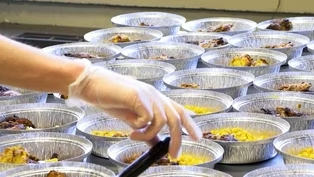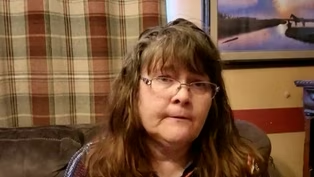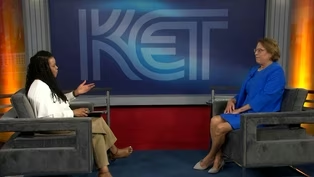
Kentucky Farmers Express Concern Amid China Trade Dispute
Clip: Season 4 Episode 76 | 3m 24sVideo has Closed Captions
Western Kentucky farmer on impact of trade dispute with China.
U.S. stocks are recovering after sell-offs on Friday following President Trump's new threat of one hundred percent tariffs on all Chinese imports. That's concerning for Kentucky farmers, who are hoping for a new trade deal with the world's second-largest economy. A lifelong farmer in western Kentucky talks about his concerns amid the trade dispute with China.
Problems playing video? | Closed Captioning Feedback
Problems playing video? | Closed Captioning Feedback
Kentucky Edition is a local public television program presented by KET

Kentucky Farmers Express Concern Amid China Trade Dispute
Clip: Season 4 Episode 76 | 3m 24sVideo has Closed Captions
U.S. stocks are recovering after sell-offs on Friday following President Trump's new threat of one hundred percent tariffs on all Chinese imports. That's concerning for Kentucky farmers, who are hoping for a new trade deal with the world's second-largest economy. A lifelong farmer in western Kentucky talks about his concerns amid the trade dispute with China.
Problems playing video? | Closed Captioning Feedback
How to Watch Kentucky Edition
Kentucky Edition is available to stream on pbs.org and the free PBS App, available on iPhone, Apple TV, Android TV, Android smartphones, Amazon Fire TV, Amazon Fire Tablet, Roku, Samsung Smart TV, and Vizio.
Providing Support for PBS.org
Learn Moreabout PBS online sponsorshipU.S.
stocks are recovering after selloffs on Friday, following President Trump's new threat of 100% tariffs on all Chinese imports.
That's concerning for Kentucky farmers, who are hoping for a new trade deal with the world's second largest economy.
China is boycotting American soybeans and retaliation for tariffs.
Our Laura Rogers takes us to western Kentucky for a farm focused segment we call rooted.
My number one concern with the tariffs right now is we have lost our biggest importer of our soybeans, which is China.
David Winchell is a corn and soybean farmer in Hancock County's Pottsville community.
China buys more than the rest of the countries in the world combined, but they're not buying any soybeans right now from the United States.
And that's one reason for falling prices.
In the past three years, our market has probably been cut $3 a bushel.
Anyway.
It's very risky right now.
Winchell says the soybean is such a valuable commodity because it has so many uses for cooking, animal feed and manufacturing, to name a few.
We need help, and the biggest help that you could give us would be to try to get our foreign market back.
As a member of the U.S.
Soybean Export Council, he's traveled as far as Egypt to advocate for U.S.
grown soy.
And he says something needs to be done to offset rising production costs.
The American farmer can't continue the way it is now with the lower commodity prices and the extreme high input prices.
And no matter how big of a yield we grow on soybeans, I'm not sure that there's any way we can be profitable.
And in the soybean market, our corn market today.
Jesse Miller is an Indiana farmer and division agronomist for Superior AG Resources.
We try to help them make better decisions and then how to grow the biggest possible crop on the inputs that we're putting out there today.
He says the biggest concern he's hearing from farmers right now is cash flow and the increasing cost of leasing farmland.
Cash rents are still high.
That's been a real issue for a lot of them.
You know, the value of land is high.
He says tariffs have also made fertilizer more expensive, adding to higher input costs.
I'm seeing a lot of friends, neighbors that are struggling financially that may not make it through the next couple of years.
If we don't have some sort of a turnaround in this market, you would like the U.S.
to explore more domestic uses for soybeans and corn through biodiesel and ethanol.
That would help use more of the product that we grow in this country.
Who's going to do this down the road 20 years?
That's a big concern for all.
In his late 50s, he's the average age of a Kentucky farmer.
There is nothing out here that incentivizes young people to come back to the farm because, you know, with what's going on here, with the tariffs, the low commodity prices.
And he's hoping both parties in Washington will work together to help find solutions for Kentucky addiction.
I'm Laura Rogers.
Thank you so much, Laura.
As for any possible aid package from the federal government, David Winchell says it would offer relief but only be a band aid and not a long term solution.
Battle Over Funding for Senior Meal Programs
Video has Closed Captions
Clip: S4 Ep76 | 2m 4s | Lawmakers say it's up to Beshear administration to fix funding for program. (2m 4s)
Celebrating Indigenous People's Day
Video has Closed Captions
Clip: S4 Ep76 | 2m 40s | Woman who pushed to have Indigenous People's Day recognized talks about its significance. (2m 40s)
Kentucky Students Learning How to Cover Cost of College
Video has Closed Captions
Clip: S4 Ep76 | 3m 54s | Class shows high school seniors how to pay for college. (3m 54s)
Looking Out for Scams During Medicare Enrollment
Video has Closed Captions
Clip: S4 Ep76 | 4m 17s | Tips on how to keep from getting scammed during Medicare enrollment. (4m 17s)
Opioid Symposium Kicks Off in Louisville
Video has Closed Captions
Clip: S4 Ep76 | 2m 48s | Kentuckians working on front lines of drug treatment and prevention convene in Louisville. (2m 48s)
Providing Support for PBS.org
Learn Moreabout PBS online sponsorship
- News and Public Affairs

Top journalists deliver compelling original analysis of the hour's headlines.

- News and Public Affairs

FRONTLINE is investigative journalism that questions, explains and changes our world.












Support for PBS provided by:
Kentucky Edition is a local public television program presented by KET




